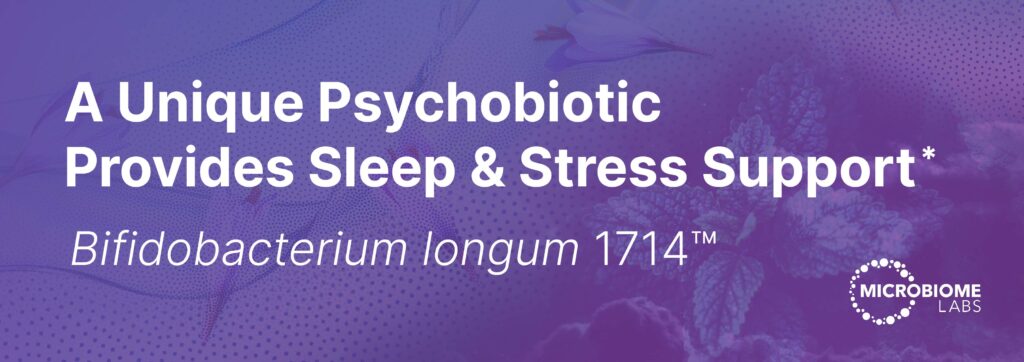A Unique Psychobiotic Provides Sleep & Stress Support*
Fortifying the gut microbiome with a specific targeted bacterial strain could be a significantly effective way of helping struggling patients overcome occasional sleeplessness and stress. The unique, gut-derived psychobiotic bacteria, Bifidobacterium longum 1714™, may help patients overcome occasional stress and sleep challenges.*
“Psychobiotics” are live probiotic strains that support brain function by engaging the gut-brain axis, a bidirectional communication pathway between the gut microbiota and the brain and central nervous system (CNS).
Bifidobacterium longum 1714™ targets the gut-brain axis, supporting brain and CNS balance to address occasional stress and sleeplessness. It may promote feelings of calmness, relaxation, and reduced tension, helping reset the natural sleep cycle.* Clinically studied in double-blind, placebo-controlled trials and more, Bifidobacterium longum 1714™ may:1-7*
- Support a reduction in perceived stress
- Improve the ability to cope with occasional stress
- Support memory function
- Positively support brainwave activity
- Support diminished mental fatigue
- Support lowered cortisol output during occasional stress
- Target the HPA axis to support cortisol balance
- Support tryptophan production
- Support increased energy/vitality quality of life scores
- Support IL-10 production
- Support digestive functions
Supplement formulas containing Bifidobacterium longum 1714™ can be enhanced with additions such as L-theanine to help maintain optimal neurotransmitter levels (serotonin, GABA, and dopamine) already within a normal range, and lemon balm extract, a perennial herb that may support calmness and drowsiness to help overcome an occasional inability to fall asleep.*
Bifidobacterium longum 1714™is clinically shown to help support the body’s response to occasional sleeplessness while maintaining healthy stress hormone (cortisol) levels and stress-coping mechanisms. Shouldn’t your investment in your patients include this innovative psychobiotic sleep support?*
References:
- Groeger, D., et al. (2022).
- Allen, A.P., et al. (2016).
- Morais, L.H., et al. (2021).
- Wang, H., et al. (2019).
- Hong, N., et al. (2021).
- Seong, G.J., et al. (2012).

